Paljor?。蹋瑁酰睿穑铩。裕铮洌幔?/h1>
2008-09-25 10:20
Tibet 2008年4期
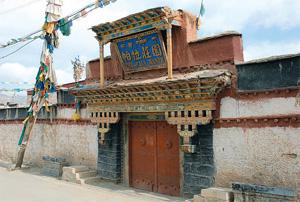
Phalha Manor is situated in Paljor Lhunpo Village of Gyantse. Out of the twelve most prominent manors in Tibet which were once owned by serf owners in old Tibet, the Phalha Manor is currently the best preserved. It is a social miniature of old Tibet that authentically illustrates the utter discrepancy between the lives of serfs and that of autocrats in the past. At present residents adjacent to the manor, for the most part, are the progeny of former serfs. There are over a dozen former serfs enjoying their freedom. These are witnesses to the transformation of Tibet.
In retrospect, Phalha Manor was a huge and very ostentatious manor and none of the other surrounding buildings could compare with its grandeur. Nevertheless, as time goes by, new buildings neighboring Phalha Manor have been erected to rival its regal charm. In comparison, the beauty and grandeur of the old manor tends to fade and dissolve.
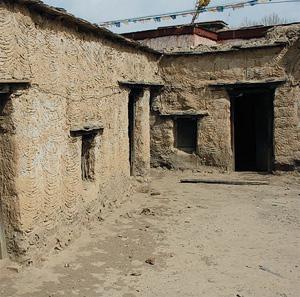
A cement-paved street cuts through the residential buildings in Paljor Lhunpo Village. The whole village appears tidy and orderly. Looking at the Manor from a distance, a pavilion stands in the middle of a pond close by a bridge that connects to the residential buildings. Beside the Manor, two residential buildings are under construction.
Occasionally, one or two cars and trucks pass by. A group of children are playing on the street and they seems not hear the Tibetan music resonating from a small grocery store. On seeing the camera, the kids dash toward the reporters and immediately form a circle. Some of them even try to grab it. They held up “V” signs in front of the reporters, broad but innocent smiles on their faces.
It is such a clean and peaceful little village without any claim to be a city.
Penlo, the village administrator of Paljor Lhunpo Village, tells the reporters that the total population of the village is 468 people in 88 households. Cultivating a total of 1767 mu of land, each villager earns 3,270 Yuan as per capital income. Its spring now and farmers are working their fields.
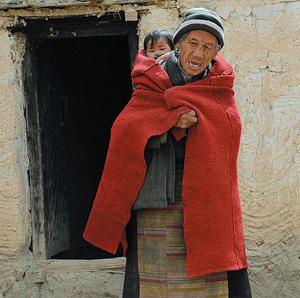
Penlo observes that when the villagers in Paljor Lhunpo Village watched the vandalism and rioting in Lhasa on TV, they reacted with spontaneous outrage. They were hardly going to be convinced by the violent behavior of those “Free Tibet” mobs, since many of these villagers experienced a life of devastation and privation under the old regime, in contrast with the current prosperity of these demonstrators. The villagers are all in agreement in opposing this vicious plot to separate Tibet from its motherland. They voted that all those who broke the law during the riots must be punished. Penlo expressed his heartfelt sympathy and sent his deepest condolences to relatives of those who were killed or injured. He advocated the government and the whole society provide all necessary assistance to these unfortunate families.
Last year on October 8th, Phalha Manor was temporarily closed due to on-going renovations even though many tourists kept coming. However, since March 14th of this year, very few tourists have visited which has had a seriously negative impact on the local economy. Penlo sighed sadly: “Without stability, there is unlikely to be a return to a vibrant economy”. Nonetheless, he believes Tibet is going to be stable, and he strives to unite the villagers and boost efforts to increase the income of the villagers. He has a deep longing for a comfortable life for his fellow villagers in the long run.
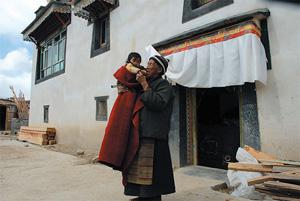
Penlos mother, Penpa Tsamjo, is already 65 years old. She was the tailor for Phalha Manor, living there together with her seven family members in a gloomy room that was only six meters square. When she guided us on a walk close by her former shabby room, she did not even glance inside. Instead an expression of inexpressible sorrow appears on her face. Fortunately, nowadays she and her six family members are living in a two-story building of 18 rooms. Once in front of her new building, a contented smile appeared on her tragedybeaten face.
Penlo observes that whenever his mother relates the events that occurred during the old days, she always reminds the younger generation to appreciate their modern life. She remembers that if anyone walked in the street, they were liable to receive a violent beating by the owners of the Manor. Clearly, that it is no longer the case today.
When the reporters found the 64-year-old Phalha Lozang Tsering, he was busy in his house. He is one of the beneficiaries of the “comfortable housing project” of Paljor Lhunpo Village in Jangra Town of Gyantse County. He has been granted a 12,000-Yuan subsidy from the local government. Now, his family is building a new house. They are on the way to achieving their dreams.
While Phalha Lozang Tsering, who is living with three generations of his relatives, is chatting with the reporters, his face reflects a profound happiness. He tells the reporters that his fellow villagers are helping to construct a house for him from an investment of 100 thousand Yuan with still another 70 thousand Yuan on the way.
He calculates his family possesses a total of 30 mu of land. He has allotted two mu of land to planting garlic and will plant maize for next year. Having kept an amount of grain for his family, he has sold the extra to gain an 80,000-Yuan annual profit. In 2002, he was supported by the agricultural development project and granted eight cows for milk production. Based on the current price of yak butter, which it is 28 Yuan per half kilogram, the income of his family from producing yak butter and milk dregs is over 90,000 Yuan. Access to electricity in Paljor Lhunpo Village has brought added convenience to every household. His family has already purchased a washing machine and a refrigerator. His green house produces a variety of vegetables, such as tomatoes and potatoes. The family is therefore enjoying self-sufficiency in vegetables for the family table. He says that when his house is finished he would like to visit the hinterland because the railway makes it so convenient.
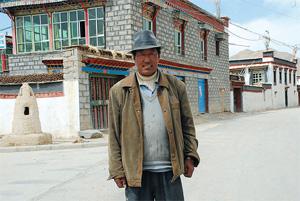
Regarding the casualties from the riots of March 14th, Phalha Lozang Tsering says that “the Dailai clique is jealous of what Tibetans have today because they clearly understand how far we have advanced since their regime... and how impossible it would be for them to restore a disguised version of their former feudal society. That is so obvious. That is why the Dalai and his conspirators were so desperate as to mastermind and organize this riot in Lhasa, burn private houses and businesses, vandalize public and private amenities in order to promote instability. We Tibetans will unite to decisively defeat their des-picable intentions.”
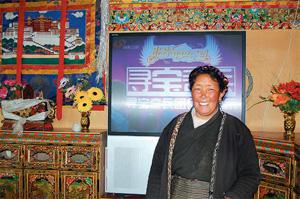
helping to construct a house for him from an investment of 100 thousand Yuan with still another 70 thousand Yuan on the way.
He calculates his family possesses a total of 30 mu of land. He has allotted two mu of land to planting garlic and will plant maize for next year. Having kept an amount of grain for his family, he has sold the extra to gain an 80,000-Yuan annual profit. In 2002, he was supported by the agricultural development project and granted eight cows for milk production. Based on the current price of yak butter, which it is 28 Yuan per half kilogram, the income of his family from producing yak butter and milk dregs is over 90,000 Yuan. Access to electricity in Paljor Lhunpo Village has brought added convenience to every household. His family has already purchased a washing machine and a refrigerator. His green house produces a variety of vegetables, such as tomatoes and potatoes. The family is therefore enjoying self-sufficiency in vegetables for the family table. He says that when his house is finished he would like to visit the hinterland because the railway makes it so convenient.
Regarding the casualties from the riots of March 14th, Phalha Lozang Tsering says that “the Dailai clique is jealous of what Tibetans have today because they clearly understand how far we have advanced since their regime... and how impossible it would be for them to restore a disguised version of their former feudal society. That is so obvious. That is why the Dalai and his conspirators were so desperate as to mastermind and organize this riot in Lhasa, burn private houses and businesses, vandalize public and private amenities in order to promote instability. We Tibetans will unite to decisively defeat their des-picable intentions.”
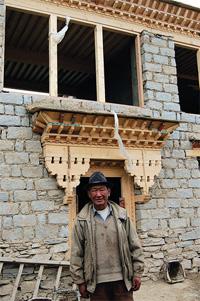
“Generally speaking, the living conditions of the villagers today are surely better than in the old days of living in the Manor. The question is which system, serfdom or socialism, is better for our villagers. Every fellow in the village knows the answer very well. The villagers living standard today is even better than that of the autocrats before the liberation. All of this, I believe, is attributable to the merits of the Chinese Communist Party”, observed Phalha Lozang Tsering.
Regarding the riot in Lhasa on March 14th, Butri, a villager of Paljor Lhunpo Village in Jangra Town of Gyantse asserts firmly: “Today our lives have never been better. But the riot, which was conducted by only a few, has impinged on all our lives. I believe peace is the primary concern to us. Our current superior lifestyle and the economic development that produced it are the direct result of the rational and favorable policies implemented by the government. However, the Dalai and his clique deprecate everything and even try everything to undermine what we have achieved. How can it be possible for us to let them realize their malicious conspiracy?”
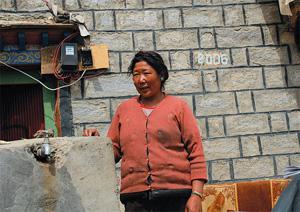
Nyima Tenzin, husband of Butri, runs a tailor shop in a pedestrian mall in the downtown of Shigatse, while they both manage the farming on the familys land, a total of 12 mu. The whole familys annual income averages about 120 thousand Yuan. They are content with their happy life. The family is equipped with a variety of electrical goods. In particular, the large digital TV set, which it cost about 10 thousand Yuan, makes the family appear wealthy. The couple has four children, and the oldest son is studying in a vocational school in the prefecture.
The tailor shop of Nyima Tenzin opened previously in Gyantse. As the business grew, the shop was moved to Shigatse in 2004. Currently, the family has bought a truck. Apparently their lifestyle is improving rapidly. They want their society to remain stable. Only stability will bring peace, happiness and a prosperous economy. Butri comments that in tandem with the successful policies of the government, her family gradually prospers and is living in a favorable economic situation. In particularly, due to the governments housing project, her family is living in a bright and spacious house. This would be implausible in the old Tibet.
The family of villager Tsering Dachok has already planted barley and wheat in the family field. Her husband and son are busy with a transportation business, while she and her daughter-in-law are taking care of parents and kids in tandem with running a small grocery store in the village. She says that when she watched some innocent people being attacked by those ruthless rioters, she burst into tears. She keeps asking why those people would want to spoil the favorable atmosphere in terms of availability of good and rational policies leading to a better economic situation for everyone. Her feelings overwhelm her and she says she believes a handful rioters causing this chaos could never achieve their aims. “Any one who dares to stir up this disorder will surely deserve the profound contempt of the local villagers”, says Tsering Dachok.
“As long as everybody does not infringe on the law and can make a living through their own hard work, the living standard will dramatically improve,” says the lady farmer of Paljor Lhunpo Village, summing up her life-long experience. This is a serene and peaceful village, but full of energy and opportunities.

Phalha Manor is situated in Paljor Lhunpo Village of Gyantse. Out of the twelve most prominent manors in Tibet which were once owned by serf owners in old Tibet, the Phalha Manor is currently the best preserved. It is a social miniature of old Tibet that authentically illustrates the utter discrepancy between the lives of serfs and that of autocrats in the past. At present residents adjacent to the manor, for the most part, are the progeny of former serfs. There are over a dozen former serfs enjoying their freedom. These are witnesses to the transformation of Tibet.
In retrospect, Phalha Manor was a huge and very ostentatious manor and none of the other surrounding buildings could compare with its grandeur. Nevertheless, as time goes by, new buildings neighboring Phalha Manor have been erected to rival its regal charm. In comparison, the beauty and grandeur of the old manor tends to fade and dissolve.

A cement-paved street cuts through the residential buildings in Paljor Lhunpo Village. The whole village appears tidy and orderly. Looking at the Manor from a distance, a pavilion stands in the middle of a pond close by a bridge that connects to the residential buildings. Beside the Manor, two residential buildings are under construction.
Occasionally, one or two cars and trucks pass by. A group of children are playing on the street and they seems not hear the Tibetan music resonating from a small grocery store. On seeing the camera, the kids dash toward the reporters and immediately form a circle. Some of them even try to grab it. They held up “V” signs in front of the reporters, broad but innocent smiles on their faces.
It is such a clean and peaceful little village without any claim to be a city.
Penlo, the village administrator of Paljor Lhunpo Village, tells the reporters that the total population of the village is 468 people in 88 households. Cultivating a total of 1767 mu of land, each villager earns 3,270 Yuan as per capital income. Its spring now and farmers are working their fields.

Penlo observes that when the villagers in Paljor Lhunpo Village watched the vandalism and rioting in Lhasa on TV, they reacted with spontaneous outrage. They were hardly going to be convinced by the violent behavior of those “Free Tibet” mobs, since many of these villagers experienced a life of devastation and privation under the old regime, in contrast with the current prosperity of these demonstrators. The villagers are all in agreement in opposing this vicious plot to separate Tibet from its motherland. They voted that all those who broke the law during the riots must be punished. Penlo expressed his heartfelt sympathy and sent his deepest condolences to relatives of those who were killed or injured. He advocated the government and the whole society provide all necessary assistance to these unfortunate families.
Last year on October 8th, Phalha Manor was temporarily closed due to on-going renovations even though many tourists kept coming. However, since March 14th of this year, very few tourists have visited which has had a seriously negative impact on the local economy. Penlo sighed sadly: “Without stability, there is unlikely to be a return to a vibrant economy”. Nonetheless, he believes Tibet is going to be stable, and he strives to unite the villagers and boost efforts to increase the income of the villagers. He has a deep longing for a comfortable life for his fellow villagers in the long run.

Penlos mother, Penpa Tsamjo, is already 65 years old. She was the tailor for Phalha Manor, living there together with her seven family members in a gloomy room that was only six meters square. When she guided us on a walk close by her former shabby room, she did not even glance inside. Instead an expression of inexpressible sorrow appears on her face. Fortunately, nowadays she and her six family members are living in a two-story building of 18 rooms. Once in front of her new building, a contented smile appeared on her tragedybeaten face.
Penlo observes that whenever his mother relates the events that occurred during the old days, she always reminds the younger generation to appreciate their modern life. She remembers that if anyone walked in the street, they were liable to receive a violent beating by the owners of the Manor. Clearly, that it is no longer the case today.
When the reporters found the 64-year-old Phalha Lozang Tsering, he was busy in his house. He is one of the beneficiaries of the “comfortable housing project” of Paljor Lhunpo Village in Jangra Town of Gyantse County. He has been granted a 12,000-Yuan subsidy from the local government. Now, his family is building a new house. They are on the way to achieving their dreams.
While Phalha Lozang Tsering, who is living with three generations of his relatives, is chatting with the reporters, his face reflects a profound happiness. He tells the reporters that his fellow villagers are helping to construct a house for him from an investment of 100 thousand Yuan with still another 70 thousand Yuan on the way.
He calculates his family possesses a total of 30 mu of land. He has allotted two mu of land to planting garlic and will plant maize for next year. Having kept an amount of grain for his family, he has sold the extra to gain an 80,000-Yuan annual profit. In 2002, he was supported by the agricultural development project and granted eight cows for milk production. Based on the current price of yak butter, which it is 28 Yuan per half kilogram, the income of his family from producing yak butter and milk dregs is over 90,000 Yuan. Access to electricity in Paljor Lhunpo Village has brought added convenience to every household. His family has already purchased a washing machine and a refrigerator. His green house produces a variety of vegetables, such as tomatoes and potatoes. The family is therefore enjoying self-sufficiency in vegetables for the family table. He says that when his house is finished he would like to visit the hinterland because the railway makes it so convenient.

Regarding the casualties from the riots of March 14th, Phalha Lozang Tsering says that “the Dailai clique is jealous of what Tibetans have today because they clearly understand how far we have advanced since their regime... and how impossible it would be for them to restore a disguised version of their former feudal society. That is so obvious. That is why the Dalai and his conspirators were so desperate as to mastermind and organize this riot in Lhasa, burn private houses and businesses, vandalize public and private amenities in order to promote instability. We Tibetans will unite to decisively defeat their des-picable intentions.”

helping to construct a house for him from an investment of 100 thousand Yuan with still another 70 thousand Yuan on the way.
He calculates his family possesses a total of 30 mu of land. He has allotted two mu of land to planting garlic and will plant maize for next year. Having kept an amount of grain for his family, he has sold the extra to gain an 80,000-Yuan annual profit. In 2002, he was supported by the agricultural development project and granted eight cows for milk production. Based on the current price of yak butter, which it is 28 Yuan per half kilogram, the income of his family from producing yak butter and milk dregs is over 90,000 Yuan. Access to electricity in Paljor Lhunpo Village has brought added convenience to every household. His family has already purchased a washing machine and a refrigerator. His green house produces a variety of vegetables, such as tomatoes and potatoes. The family is therefore enjoying self-sufficiency in vegetables for the family table. He says that when his house is finished he would like to visit the hinterland because the railway makes it so convenient.
Regarding the casualties from the riots of March 14th, Phalha Lozang Tsering says that “the Dailai clique is jealous of what Tibetans have today because they clearly understand how far we have advanced since their regime... and how impossible it would be for them to restore a disguised version of their former feudal society. That is so obvious. That is why the Dalai and his conspirators were so desperate as to mastermind and organize this riot in Lhasa, burn private houses and businesses, vandalize public and private amenities in order to promote instability. We Tibetans will unite to decisively defeat their des-picable intentions.”

“Generally speaking, the living conditions of the villagers today are surely better than in the old days of living in the Manor. The question is which system, serfdom or socialism, is better for our villagers. Every fellow in the village knows the answer very well. The villagers living standard today is even better than that of the autocrats before the liberation. All of this, I believe, is attributable to the merits of the Chinese Communist Party”, observed Phalha Lozang Tsering.
Regarding the riot in Lhasa on March 14th, Butri, a villager of Paljor Lhunpo Village in Jangra Town of Gyantse asserts firmly: “Today our lives have never been better. But the riot, which was conducted by only a few, has impinged on all our lives. I believe peace is the primary concern to us. Our current superior lifestyle and the economic development that produced it are the direct result of the rational and favorable policies implemented by the government. However, the Dalai and his clique deprecate everything and even try everything to undermine what we have achieved. How can it be possible for us to let them realize their malicious conspiracy?”

Nyima Tenzin, husband of Butri, runs a tailor shop in a pedestrian mall in the downtown of Shigatse, while they both manage the farming on the familys land, a total of 12 mu. The whole familys annual income averages about 120 thousand Yuan. They are content with their happy life. The family is equipped with a variety of electrical goods. In particular, the large digital TV set, which it cost about 10 thousand Yuan, makes the family appear wealthy. The couple has four children, and the oldest son is studying in a vocational school in the prefecture.
The tailor shop of Nyima Tenzin opened previously in Gyantse. As the business grew, the shop was moved to Shigatse in 2004. Currently, the family has bought a truck. Apparently their lifestyle is improving rapidly. They want their society to remain stable. Only stability will bring peace, happiness and a prosperous economy. Butri comments that in tandem with the successful policies of the government, her family gradually prospers and is living in a favorable economic situation. In particularly, due to the governments housing project, her family is living in a bright and spacious house. This would be implausible in the old Tibet.
The family of villager Tsering Dachok has already planted barley and wheat in the family field. Her husband and son are busy with a transportation business, while she and her daughter-in-law are taking care of parents and kids in tandem with running a small grocery store in the village. She says that when she watched some innocent people being attacked by those ruthless rioters, she burst into tears. She keeps asking why those people would want to spoil the favorable atmosphere in terms of availability of good and rational policies leading to a better economic situation for everyone. Her feelings overwhelm her and she says she believes a handful rioters causing this chaos could never achieve their aims. “Any one who dares to stir up this disorder will surely deserve the profound contempt of the local villagers”, says Tsering Dachok.
“As long as everybody does not infringe on the law and can make a living through their own hard work, the living standard will dramatically improve,” says the lady farmer of Paljor Lhunpo Village, summing up her life-long experience. This is a serene and peaceful village, but full of energy and opportunities.

